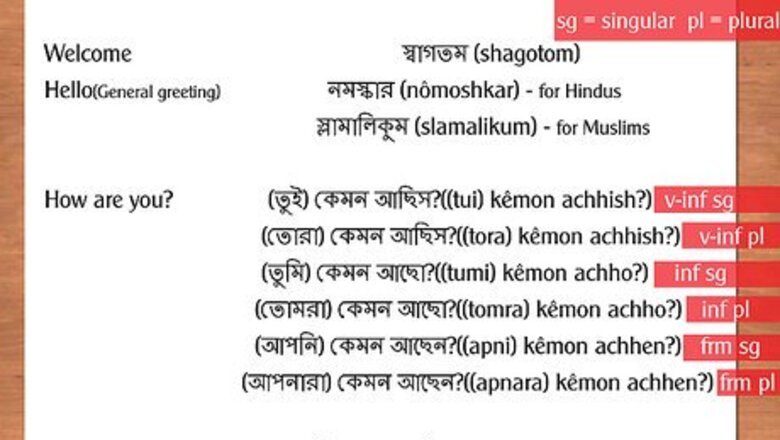
views
Begin Speaking the Language
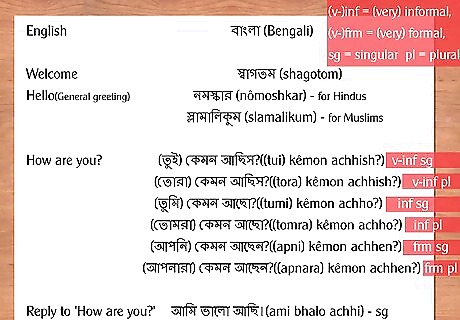
Establish a list of common words or phrases you intend to master. Common phrases are useful and isn’t a bad way to start if you want to one day become fluent. Start by taking a look at some common Bengali words and their phonetic English pronunciation.
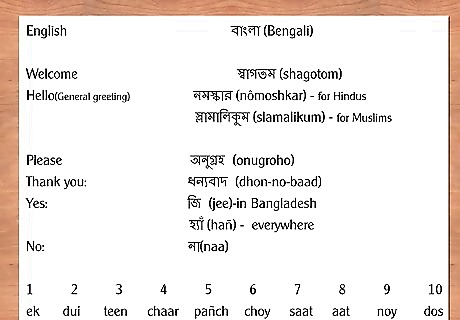
Learn greetings, pleasantries, and numbers. Learning these words are necessary even just to be polite. Learning numbers is useful so you don't have to use your fingers to explain prices. Hello: Salaam (purely for Muslim) or "NawMoShkar" (purely for Hindu) Goodbye: "aabar dekha hobe" (form of saying goodbye but means we'll meet again) Please: "doya kore or onugroho" Thank you: "dhon-no-baad" Yes: "jee-in Bangladesh" "hañ"(everywhere) No: (naa) 1, 2, 3, 4, 5, 6, 7,8, 9, 10: "ek, dui, teen, chaar, pañch, choy, saat, aat, noy, dos"
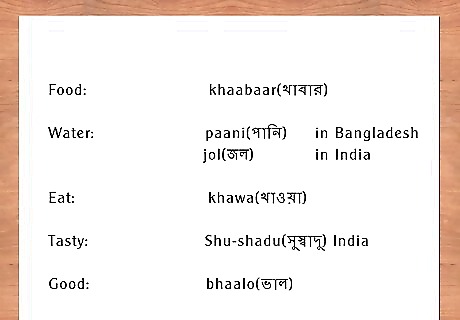
Learn words related to eating. Food is a basic human need, and odds are you're going to have to talk about it at some point. Make sure you know the appropriate words for what you plan to ask for, even if it's very basic. Food: "khaabaar" Water: "paani-in Bangladesh" or "jol-in India" Eat: খাও "khao" (informal) "khaan" (formal) Tasty: "moja-in Bangladesh" or "Shu-shadu India" Good: "bhaalo"
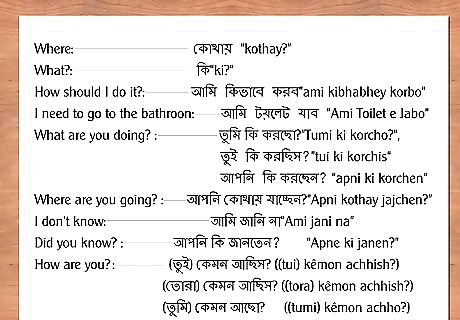
Learn basic questions. If you want to be able to inquire about things like the bathroom or how someone is doing, you can learn the basic words that will enable you to do that. Where: "kothay?" What?: "ki?" How should I do it: "ki bhabey korbo", "ami ki bhabhey korbo" I need to go to the bathroom: "Ami Toilet e Jabo" What are you doing? :"Tumi ki korcho?", "tui ki korchis", "apni ki korchen" Where are you going? : "Apne kun jagay jajchen?" I don't know: "Ami jani na" Did you know? : "Apne ki janen?" How are you?: "kemon acho" "kemon achis" (informal) "kemon achen" (formal)
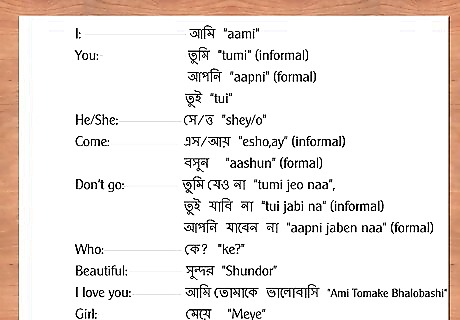
Learn how to talk about yourself and others. I: "aami" You: "tumi" (informal) "aapni" (formal) "tui"তুই" (informal generally used while close friends are having a conversation between them) He/She: "shey/o" Come: "esho,ay" (informal) "aashun" (formal) Don't go: "tumi jeo naa", "tui jabi na" (informal) "aapni jaben naa" (formal) Who: "ke?" Beautiful: "Shundor" I love you: "Ami Tomake Bhalobashi" Girl: "Meye" Boy: "Chele"
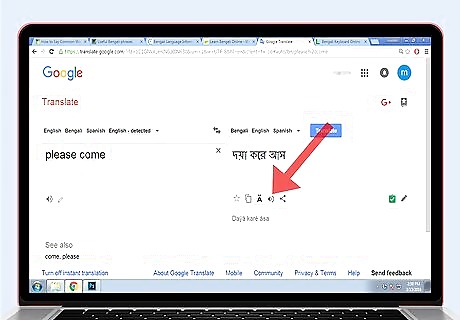
Consult your alphabet if you're having trouble. Remember being a little kid and having teachers telling you to sound it out? With Bengali, that's even more important. Since the alphabet is syllabic it is a little easier to sound out the whole word.
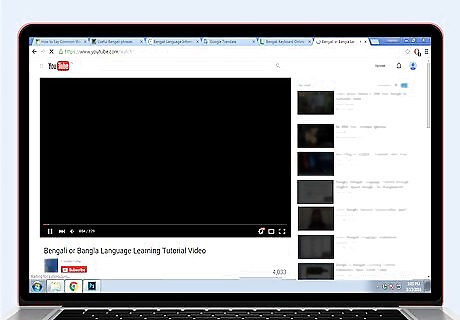
Don't be afraid to look for help. If you can't figure out how to say a word or it doesn't sound correct, search the internet for the correct pronunciation. There are all sorts of very short videos that can help you double check your pronunciation.
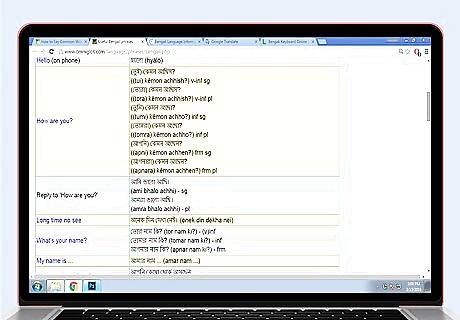
Get going! Learning any language is hard, but starting with common phrases is a great way to begin getting a handle on the language. It will also help you navigate if you are traveling to an area where people speak the Bengali language. Start with the basics.
Learning the Basics of Bengali
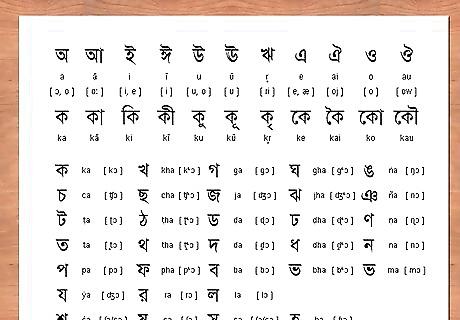
Learn the alphabet. The Bengali alphabet is syllabic and all consonants have an inherent vowel with two different pronunciations. It’s important that you learn these if you want to recognize and speak common words accurately. Learn to draw the alphabet as you learn what sound each letter makes. This will help you recognize the letter much more easily. Try learning the alphabet the same way you learned the English alphabet as a little kid. Draw out each letter and see the sound that it makes as you draw it out. You'll have to memorize all of them.
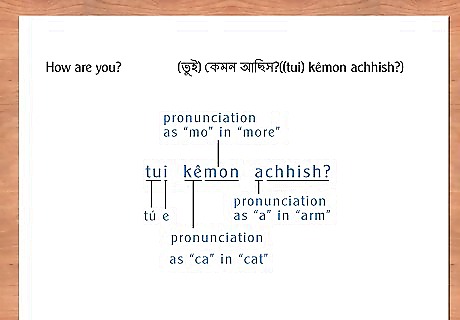
Learn basic pronunciations. Study the sound that each letter makes, not just the way the letter works. Unlike English, many letters make multiple sounds. Try to master these sounds. For example, go through the alphabet and practice matching the pronunciations for two letters together into short words. This will give you an idea of how to combine letters. You’ll also want to understand certain pronunciations that are different than English. For example, the sound of T is a soft T – similar to the T in Spanish.
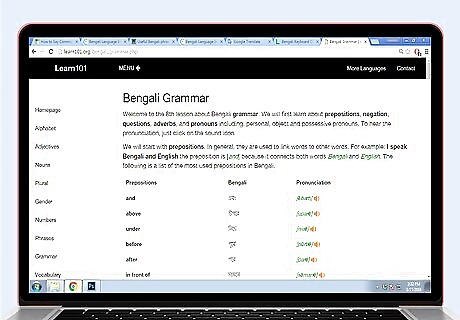
Start learning basic grammar. You don't need to become an expert, you just need to recognize the differences from your own language. Understanding how the language operates will give you a better understanding of what you are actually saying. Once you understand that, you'll better be able to say common words in the correct context. Bengali operates with a subject, object, verb word order versus a subject, verb, object order like English. Bengali also uses postpositions rather than prepositions. Like English, there is no grammatical gender – however, verbs do indicate person, tense, and status.
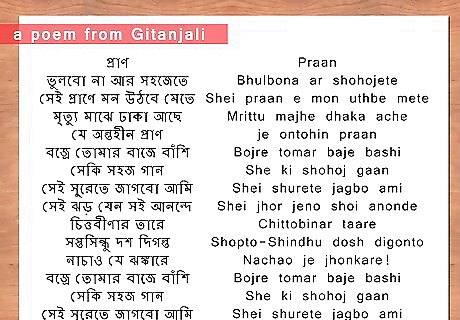
Do some reading. Find a book written and Bengali and start flipping through the pages. You don’t need to understand the story or even the words, just try to recognize the letters and pick out common words that you know. This will familiarize you with words that are used the most. If you can, find a children's book that relates to numbers and food. You probably will want to familiarize yourself with these words the most if you are going to be traveling.
Practicing Your Bengali
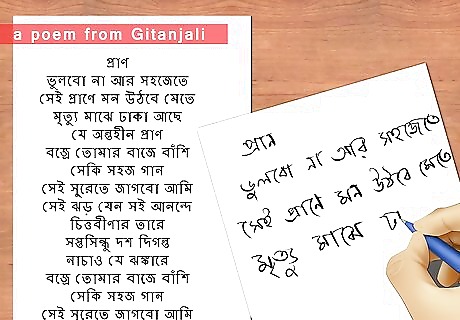
Practice on your own. Write down words and say them out loud to yourself. You can buy a workbook if you want some extra help, or find worksheets online. You can find plenty of videos online that offer the correct pronunciation of words. Try to match what you’re saying with the correct pronunciation. It doesn’t matter if you know what the word means if no one else can understand what you’re saying.

Practice with a Bengali online. If you don’t have a Bengali friend to speak with, you can always find one online! Search “Speak with a Bengali” online and you’ll find plenty of sites that allow you to speak with someone over the Internet. Even if you’re just exchanging small pleasantries this is a good start.
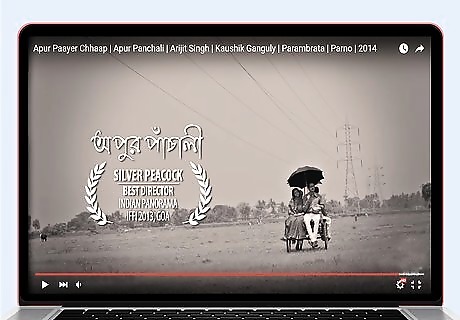
Watch movies. Find a movie that is entirely in the Bengali language. Even if you don’t know what is going on this will help you get an idea of the rhythm of the language and how words are said. You’ll be surprised how helpful it is.

















Comments
0 comment